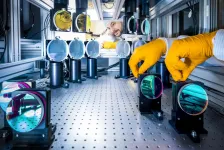A survey of American College of Surgeons members found almost two-thirds treat firearm injuries and more than 85 percent support the organization advocating for policies to reduce firearm-related injuries. Forty-two percent of ACS members keep firearms in their homes and nearly one-third (32 percent) of surgeon firearm owners store firearms unlocked and loaded. Survey findings will enable the ACS to identify ways to engage all members, including gun owners, and advocate for initiatives that prevent firearm-related injuries. CHICAGO (July 22, 2021): In what may be the largest survey of physician attitudes about firearms and how firearm-owning surgeons store guns in their homes, U.S. members of the American College of Surgeons (ACS) said they support the organization taking an active role in advocating for policies and programs designed to lower the risk of firearm-related injuries and deaths. The advocacy initiatives they support include preventing people with serious mental illness from buying firearms and cracking down on illegal firearms sales.
Results from the survey of 54,761 U.S. ACS members, of whom 11,147 responded, have been published as two articles on the website of the Journal of the American College of Surgeons (JACS) in advance of print.
One article reported broad support among members, ranging from medical students to retired surgeons, for a number of initiatives to reduce firearm injuries. More than 60 percent of surveyed members said they treat firearms injuries, and almost three-quarters "support the ACS being right at the frontline of solving this issue," said lead study author Deborah A. Kuhls, MD, FACS, interim assistant dean for research and professor of surgery at the Kirk Kerkorian School of Medicine at the University of Nevada Las Vegas. That is, survey respondents said it's very or extremely important for the organization to support policies to lower the incidence of firearm injury.
The second article analyzed survey data on the subset of ACS members who own firearms (42 percent), their reasons for firearm ownership, and how they store their guns (61 percent of whom lock them up) and ammunition. Those habits compare favorably to what smaller surveys have found about storage habits of gun owners in the broader population. A 2015 survey of 3,949 adults in households with children found that only 30 percent store firearms unloaded and locked.1 A more recent online survey of 1,444 firearm owners found that only 46 percent safely store all of their firearms.2
"What's really important about the work that came out of this survey is that it provided data that speak for most of the membership of the ACS," said Brendan T. Campbell, MD, MPH, FACS, lead author of the study on firearm storage habits and a pediatric surgeon at Connecticut Children's in Hartford. "It really helps the ACS speak with a unified voice on this sometimes contentious issue."
The ACS Committee on Trauma (COT) commissioned the survey to get a clearer idea of members' attitudes and behaviors about firearms and preventing firearm injuries. More than 20 percent of the ACS membership completed the survey. The authors stated this is the largest survey of American physicians related to firearms ownership and storage practices.
Dr. Kuhls noted that the publication of the articles is timely because firearm deaths in the U.S. have continued to increase since the survey was conducted in 2018. The nonprofit Gun Violence Archive reported 43,558 firearm deaths in 2020, 19,379 from gun violence and 24,090 from suicides where a firearm was used, compared with 39,537 firearm deaths in 2019.3 Firearm deaths in the first six months of this year are already exceeding last year's pace, with an estimated 22,804 all-cause firearm deaths through July 7.4
"The objective of this study was not to say firearms are good, firearms are bad, or this is exactly what the ACS should do, but rather to understand clearly what ACS members think can and should be done to make firearm ownership as safe as possible," Dr. Campbell added.
Firearm ownership findings
Among ACS members who own firearms, 82 percent own long guns, 82 percent own handguns, and 32 percent own high-capacity magazine-fed semi-automatic rifles (totals exceed 100 percent because many respondents own more than one type of firearm). Study results also ascertained why they own firearms: 75 percent say for self-defense and 73 percent for target practice.
Reasons for gun ownership varied by gender. Women were more likely to own a gun for self-defense, while men were more likely to do so for target shooting and hunting. Urban respondents were more likely to own handguns; rural respondents more likely to own long guns. Nineteen percent said they had taken a concealed carry course. While 42 percent of ACS members keep firearms in their home, nearly two-thirds (63 percent) of ACS members have had some type of firearm training.
"There's a real opportunity for surgeons to promote safe firearm storage and responsible firearm ownership," said Dr. Campbell, who is a firearm owner and Chair of the Injury Prevention and Control Committee of the ACS COT. He credited Ronald M. Stewart, MD, FACS, Medical Director of ACS Trauma Programs, and ACS COT Chair Eileen M. Bulger, MD, FACS, with wanting to engage firearm owners in this effort. "Who better than the surgeons who care for the victims of gun violence in this country to be the leaders in its prevention?" Dr. Campbell said.
Firearm injury prevention analysis and consensus
The injury prevention analysis included three questions about respondents' attitudes toward gun ownership. Answers were just about even on whether gun ownership is beneficial or harmful, with 22.8 percent saying it's beneficial, 21.6 percent saying it's harmful, and 49.2 percent saying it's both. Rural respondents viewed firearm ownership most favorably, with 32.3 percent saying it's beneficial vs. 17.9 percent for respondents from large cities.
Regarding firearm ownership and personal liberty, 41.7 percent indicated that it protects personal liberty vs. 8.5 percent who said it limits personal liberty and 44.8 percent saying it did neither. Further, 73.7 percent of respondents indicated that firearm ownership is a constitutionally protected right.
Respondents were also asked to rate their support on a scale of 1 to 5 for 25 possible advocacy/policy initiatives, with 85.5 percent indicating that it's important to support policy initiatives to reduce firearm injuries and deaths. Receiving the highest scores--4.4 or higher--were preventing people with mental illness from purchasing firearms; increasing penalties for dealers who sell guns illegally or bypass background checks and for straw purchasers (people who give guns to others illegally); enhancing the National Instant Criminal Background Check System (NICS); and using NICS for mandatory background for all gun purchases from authorized dealers.
"The results were really overwhelmingly in support that the ACS should play a role in decreasing firearm injuries and deaths," Dr. Kuhls said. "There was broad support that this is a public health problem and that the ACS should be leading and joining other organizations in addressing this very unfortunate cause of injuries and death in the United States."
Sixteen suggested initiatives carried a score of 4 or above, which was considered very important. But there wasn't such strong consensus on the other nine initiatives, such as increasing interstate reciprocity on concealed carry permits and allowing teachers and staff to carry concealed weapons in schools scored at the bottom. Nor was there strong consensus on limiting firearm ownership to people age 21 and over.
"There is uniformity that this is a huge public health problem, we need to do something about it, and we need to be sure that the people who own firearms can be responsible owners," Dr. Kuhls said. "It's even stronger in certain ethnic backgrounds for which we didn't have an adequate sample in our previous work."
Dr. Kuhls added, "Some of the results really speak for all members regardless of age and regardless of where they practice, whether they own firearms or not, regardless of what demographic group they represent. I think that's part of the real power of this study."
INFORMATION:
Coauthors of the prevention article with Dr. Kuhls were Drs. Campbell, Bulger and Stewart, along with Arielle Thomas, MD, MPH, and Holly Michaels, MPH, both with the ACS COT. Preliminary findings were presented at the American College of Surgeons Annual Clinical Congress, San Francisco, CA, October 2019.
Coauthors of the firearm storage article with Dr. Campbell were Drs. Kuhls, Bulger and Stewart, and Cynthia L. Talley, MD, FACS, of the Medical University of South Carolina, Department of Surgery, in Charleston. Preliminary findings were presented at the 78th Annual Meeting of the American Association for the Surgery of Trauma which was held virtually in September 2020.
The authors have no financial relationships to disclose.
"FACS" designates that a surgeon is a Fellow of the American College of Surgeons.
Citation: Survey of American College of Surgeons Members on Firearm Injury Prevention, Journal of the American College of Surgeons. DOI: https://doi.org/10.1016/j.jamcollsurg.2021.06.020.
Citation: Firearm Storage Practice of US Members of the American College of Surgeons. Journal of the American College of Surgeons. DOI: https://doi.org/10.1016/j.jamcollsurg.2021.05.024.
______________________
1 Azrael D, Cohen J, Salhi C, Miller M. Firearm storage in gun-owning households with children: Results of a 2015 National Survey. J Urban Health. 2018;95:295-304.
2 Crifasi K, Doucette ML, McGinty EE, Webster DW, Barry CL. Storage practices of gun owners in 2016. Am J Pub Health. 2018. DOI: 10.2105/AJPH.2017.304262.
3 Gun Violence Archive. Past Summary Ledgers. Verified July 5, 2021. Available at: https://www.gunviolencearchive.org/past-tolls.
4 Gun Violence Archive 2021. Update July 7, 2021. Available at: https://www.gunviolencearchive.org.
About the American College of Surgeons
The American College of Surgeons is a scientific and educational organization of surgeons that was founded in 1913 to raise the standards of surgical practice and improve the quality of care for all surgical patients. The College is dedicated to the ethical and competent practice of surgery. Its achievements have significantly influenced the course of scientific surgery in America and have established it as an important advocate for all surgical patients. The College has more than 82,000 members and is the largest organization of surgeons in the world. For more information, visit http://www.facs.org.

